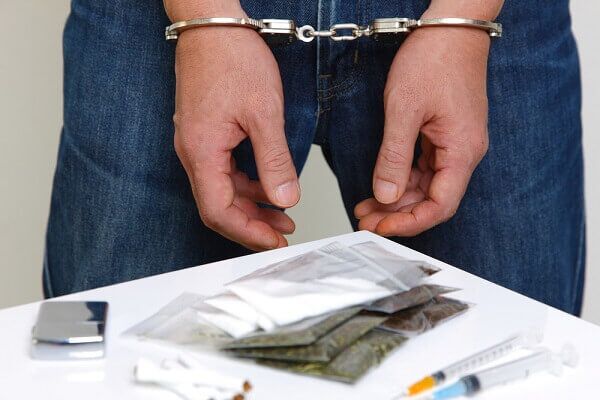Drug trafficking is nothing new to the United States. In fact, it started in the early 19th Century with everything from opium to cocaine to marijuana.
While it is nothing new, the laws we have today for drug traffickers (and the harsh penalties they face) have evolved over the years as the crime itself became more sophisticated.
The crime itself is damaging to the US in many ways. Not only does it affect the economy, but creates a deadly spiral of consequences for healthcare, insurance, law enforcement, and even families.
The Notable Times of Drug Trafficking in the US and Albuquerque
Drug trafficking first started with opium and moved its way into more sophisticated drugs – including designer drugs.
The history is rich and vast – and in some cases impressive. The way drug dealers and cartels evolved their processes to keep away from law enforcement and enhance their business is almost poetic.
Opium Trade in the United States
The first documented start of trafficking was in the mid-1800s when Chinese immigrants came into the US bringing opium. They introduced Californians to smoking opium, and the trade and distribution of the drug became a regular practice.
In fact, it was so popular that opium dens were created for designing, selling, and distributing the drug. Eventually, opium left California and slowly made its way across the country – finally reaching New York.
After opium, Americans started to experiment with other opium-containing drugs, including morphine, codeine, and painkillers.
Many Confederate and Union soldiers were addicted to these drugs. The Harrison Act of 1914 finally outlawed them.
A black market was established by 1925 in Chinatown in New York. By this time, there were an estimated 200,000 Americans addicted to the substance.
The Introduction of Mafia Smuggling
Before the days of cartels, there were mafias. The American mafia families started smuggling illegal drugs into the country in 1950. Not only did these groups engage in organized crime, but they were the paving blocks of cartels today.
Most mafias focused on opium that they would bring in through French connections.
The Vietnam War’s Role in Drug Distribution
While the US was deep into the Vietnam War (1965-1970), heroin smuggling into the United States skyrocketed.
Drug use was high among soldiers, and 15 percent of active soldiers by 1971 were reported addicts. Many more admitted to smoking marijuana and using other illegal substances.
By this time, the number of addicts in the country jumped to 750,000.
The First Major Cartel: Pablo Escobar and the Medellin Cartel
By the late 1970s, cartels began emerging and supplying cocaine to countries, including the US. The Medellin Cartel was one of the first major cartels based out of Colombia operating during that time frame.
The Medellin Cartel was extremely violent, killing 40 people during a weekend known as the Medellin Massacre in response to Colombian police seizing over 600 kilos of cocaine off a plane. The cartel grew in power, and by 1980 it was run by the infamous Pablo Escobar and brought in over $60 million per day in profits.
The Panamanian Drug Trade of 1982
The Panamanian General Manuel Noriega allowed the Medellin Cartel to continue trafficking cocaine through the Panama Canal. In response, George H.W. Bush initiated the South Florida Drug Task Force.
The Cali Cartel
The Cali Cartel is another infamous drug operation run by a band of brothers. During their peak operations in the 1990s, they were believed to supply over 80 percent of the US cocaine supply. They were also a multi-billion-dollar smuggling operation until their capture in 1995.
The Infamous El Chapo
The United States and Mexico border was the infamous spot where drug cartels and traffickers would bring their products in and out of the US.
The Sinaloa Federation, still in operation today, is the most notorious cartel still operating in Mexico. They are known for distributing more than 200 tons of cocaine along with heroin into the country. Their infamous leader, Joaquin El Chapo Guzman, escaped from prison multiple times until Mexican authorities arrested him in 2016 and extradited him to the US in 2017 to face charges.
The Concern over Drug Trafficking Is Still Warranted
The trafficking in and out of the United States is still a concern for law enforcement. There are organizations across the globe, including those in the Middle East. The Taliban and Al-Qaeda are major players in the shipment and production of drugs, including cocaine, heroin, and designer drugs.
Colombian cartels and Mexican organizations also remain problematic.
Drug trafficking offenses in the United States have focused primarily on six substances:
- Powder Cocaine
- Methamphetamine
- Marijuana
- Crack Cocaine
- Heroin
- Oxycodone
In one report, it was found that Americans have spent $100 billion a year on illegal drugs from 2004 to 2014.
Drug trafficking will never stop, but lawmakers have made the penalties for doing so a deterrent for some in the future.
What Are the Penalties of Drug Trafficking?
Trafficking is typically a federal offense. In some instances, it is a capital crime that includes the death penalty – especially if a death occurs during the crime.
Sentences depend on the amount of the product, the type of product, and other circumstances of the case. The prison sentence can range from as little as three to five years all the way to life in prison. It is a felony, which makes it more severe than possession charges.
An Attorney Is Key to a Trafficking Defense
Lawmakers want to see anyone accused of trafficking behind bars. That means instilling harsh penalties and using some as examples to society. If you have been arrested for suspected trafficking, you need a criminal defense attorney ready to fight for you.
Speak with an attorney from New Mexico Criminal Law Offices today. Our attorneys know how to defend against drug crimes, and we have helped countless defendants just like you with their case.
Schedule a free case evaluation at 505-375-4671, or request more information online.


